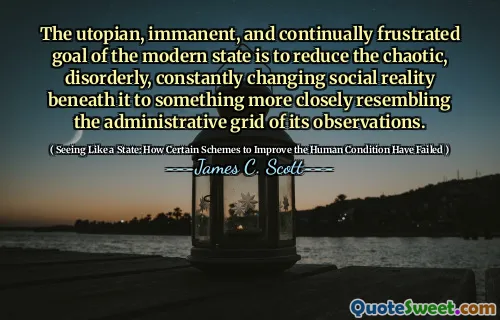In "Seeing Like a State," James C. Scott explores how various state-led initiatives aimed at improving society often miss the mark. He argues that these grand schemes frequently lack a nuanced understanding of local contexts and complexities, leading to their failure. The book emphasizes the idea that state perspectives can oversimplify human behaviors and traditions, disregarding the knowledge that local populations hold.
Scott illustrates his points through historical examples, such as the failures of collectivization in agriculture and planned urban developments. He contrasts the rigidity of state planning with the flexibility and adaptability of local practices. This highlights how grassroots knowledge can provide effective solutions that top-down approaches overlook. The author delves into how the state's desire for order often leads to detrimental consequences for communities.
More »
Today Birthdays
1963 -
Donna Tartt
1955 -
Carol Ann Duffy
1948 -
David Davis
1943 -
Margaret MacMillan
1902 -
Norman Maclean
1812 -
Samuel Smiles
1805 -
Joseph Smith, Jr.
1896 -
Giuseppe Tomasi di Lampedusa
1918 -
Helmut Schmidt
1947 -
Bill Rodgers
1980 -
Wael Ghonim
1967 -
Carla Bruni
1964 -
Eddie Vedder
1943 -
Harry Shearer
1984 -
Alison Sudol
1967 -
Roz Savage
1976 -
Kyle Kinane
1942 -
Quentin Bryce
1979 -
Summer Altice
1944 -
Wesley Clark
1947 -
Graham Hawkes
1938 -
Bob Kahn
1986 -
Noel Wells
1975 -
Lady Starlight
1933 -
Frank Morgan
1949 -
Adrian Belew
1975 -
Kirby Smart
1957 -
Trisha Goddard
